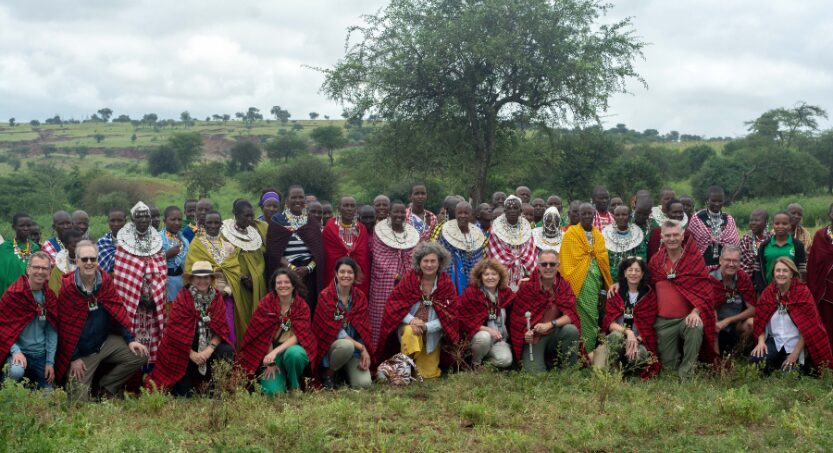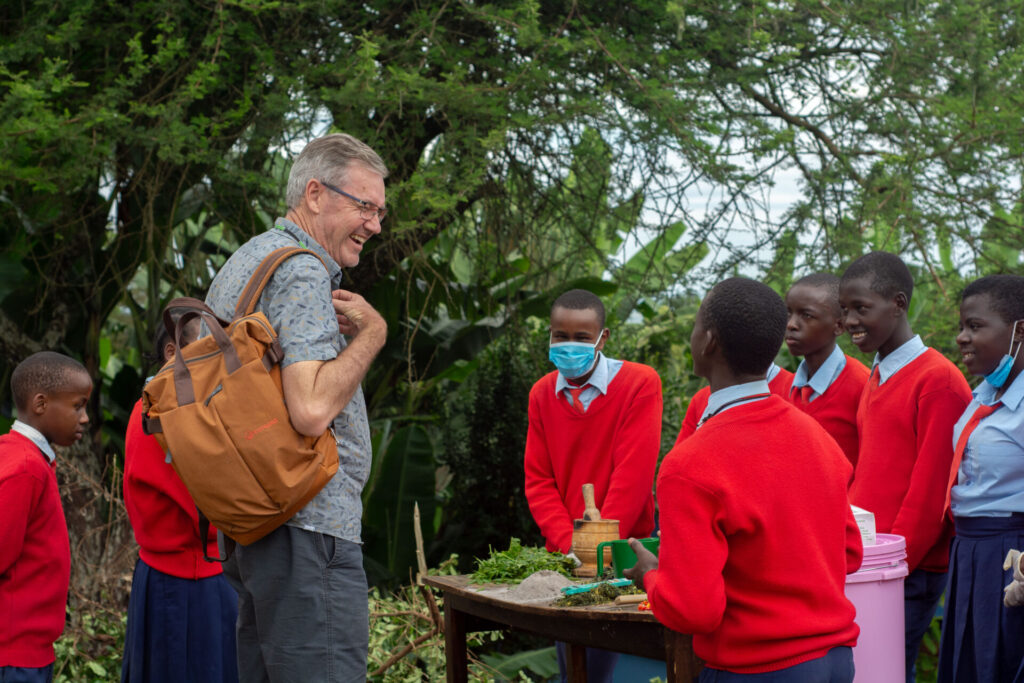‘Listen, learn and see where we can assist’: international giving at its heart

Philanthropy and travel. It’s not a match that comes to mind immediately, unless you are talking about Intrepid Travel, the Intrepid Foundation and the Australian International Development Network (AIDN).
Thanks to an introduction by AIDN, Philanthropy Australia’s Giving News interviewed Anna and Darrell Wade. Darrell is Chair and Non-Executive Director of the Intrepid Foundation and co-founded Intrepid Travel with Geoff ‘Manch’ Manchester in 1989. Anna has worked with the Intrepid Foundation for more than 17 years, progressing campaigns on issues including animal welfare, human rights and economic empowerment.
Giving News: How did you start in philanthropy?
Darrell Wade: It goes right back to that formative journey in Africa when Anna and I and Manch, my co-founder, were travelling through Africa. That’s when the genesis of Intrepid happened.
We also thought, if we start to make a living out of travel to developing countries, then we should be ploughing something back into those countries. Particularly for people in communities that don’t get access to the benefits of tourism.
From very, very early on we started to support different causes and communities. Our staff got on board in the relatively early days too. And our travellers did as well. The whole thing was very organic.
Anna Wade: With Intrepid we’ve always had an emphasis on the environment. As travellers, that impacts us. Most of the people who work for Intrepid really care about the environment.
The other emphasis is international aid – Intrepid travellers really wanted to give to causes in the places they’d visited.
I’ve also ended up realising that a dollar goes a really long way in other countries – much further than it does in Australia.

Darrell Wade with students from Orkeeswa, in northern Tanzania. Photo by Kate Holland, provided by AIDN.
GN: Is that sentiment aligned to Peter Singer’s “the life you can save” philosophy?
DW: It absolutely is aligned. We have met Peter a few times and that approach resonates with us. A life is a life, and it doesn’t matter whether it’s down the road in Fitzroy or on the other side of the world in Uganda. People have kids who need education, parents who need healthcare etcetera.
The more you think about it, giving internationally is really a no brainer. The logic is just so compelling.
AW: How is it that we have so much and then get so upset if our printer doesn’t work? People on the other side of the world are lucky to have a meal.
GN: Why is it so important to get out and meet teams and local leaders on the ground in Africa and other low resource countries?
AW: You see the people who are best equipped to know what to do with the donor funds – the people who live there.
In the last two years we’ve been to Africa with AIDN twice. The first was on the back of the Segal Family Foundation meeting in Kigali, Rwanda. We then travelled around Rwanda and Uganda looking at different projects. Last year, we went to Kenya and Tanzania and again had an amazing experience.
DW: I got an insight into Africa that I’ve never had before. Those two trips were invaluable – it’s my kind of learning! I also learnt a huge amount from the people in the group. You might be getting back on a bus and leaving somewhere. You’re just having a yak to the person next to you and that conversation starts to build about what your impact might be and what good philanthropy looks like.
I don’t think you’ll get that level of personal development in your approach to philanthropy unless you have a week or two doing a trip like an AIDN tour.
GN: Darrell, you are planning to go on the upcoming AIDN trip to Timor-Leste. Do Australians in general, and funders in specific, need to learn more about Timor-Leste – Australia’s closest neighbour geographically?
DW: I know the region reasonably well but have never been to Timor-Leste.
Timor-Leste is close to Australia and that is really important. It’s still a relatively new country and a small country. You put small and new together and it’s inherently hard for that country to make its way in the world. I plan to listen, learn and see where we can assist.
GN: What would you say to a funder thinking about going to Africa or Timor-Leste with AIDN?
DW: Just go! If in doubt, go.
I think the caveat is that the trips aren’t holidays. You want to with the mindset that it’s part of your year’s work.
It’s also important to note, that there’s no obligation whatsoever to do any philanthropy because of the AIDN trips.
GN: Do you have any final remarks?
DW: One of the things that people don’t expect is that philanthropy can be a very joyous experience.
AW: There’s also something that’s taken me a while to learn and certainly was reemphasised by going to Africa. It’s the importance of giving untied funding.
My message to philanthropists is find a charity that is doing good work that you believe in, then give, and let them use the money how they need to. They might need a new computer. They might need to pay their staff more. They might be able to employ another person. We’re not the ones who make those decisions. Just say, “you look like you’re doing good work, and I believe in what you’re doing – here you go”.
+++
Places are available for funders on upcoming AIDN Insight Tours:
- The Warm Heart of Africa: Malawi and Zimbabwe – July 2025
- Timor-Leste – October 2026
For more information visit: https://aidnetwork.org.au/insight-tours/
Top photo caption: Darrell and Anna Wade with the AIDN insight tour guests and staff and beneficiaries of an organisation called WAEV in northern Tanzania. Photo by Kate Holland, provided by AIDN.